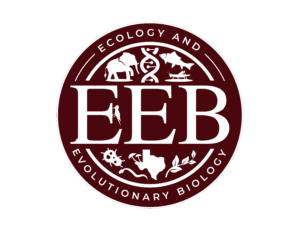Core Faculty Research Themes
Alphabetical listing of all faculty
Behavioral Ecology (Integrative Animal Behavior) is the study of the evolutionary basis for animal behavior due to ecological pressures.
| Name | Title | Dept | Interest |
| Behmer, Spencer | Professor | Entomology | Insect physiology and behavior, including their ecological and evolutionary bases |
| Brightsmith, Donald | Associate Professor |
Veterinary Pathobiology | Ecology and conservation of macaws and parrots |
| Foroughirad, Vivienne | Assistant Professor |
Marine Biology | Behavioral ecology and genetics of cetaceans |
| Grace, Jacqueline | Assistant Professor |
Ecology & Conservation Biology | Ecophysiology and behavior of birds |
| Gursky, Sharon | Professor | Anthropology | Behavioral ecology and conservation of non-human primates |
| Helms, Anjel | Assistant Professor |
Entomology | Chemical ecology, tritrophic and plant-herbivore interactions |
| Merlin, Christine | Assistant Professor |
Biology | Circadian biology |
| Moran, Rachel | Assistant Professor |
Biology | Behavior, adaptation, diversification in fish species |
| Rangel, Juliana | Associate Professor |
Entomology | Population, disease and reproductive biology of honey bees |
| Rodrigues, Antonio M.M. | Assistant Professor |
Ecology & Conservation Biology | Social evolution and altruism, demography and life history evolution, multilevel selection and intergroup cooperation, host-symbiont interactions, behavioral ecology and conservation |
| Smotherman, Michael | Professor | Biology | Physiology and evolution of vocal motor pathway in mammals |
| Song, Hojun | Associate Professor |
Entomology | Insect systematics; phylogenetics of orthopteran insects; phenotypic plasticity; character evolution |
| Sword, Gregory | Professor | Entomology | Insect, plant & microbial ecology |
| Tomberlin, Jeffery | Professor | Entomology | Ecology and biology of flies associated with decomposing matter |
| Vargo, Ed | Professor and Endowed Chair |
Entomology | Urban and structural entomology |
| Wicksten, Mary | Professor | Biology | Behavior, classification and ecology of decapod Crustacea, plus adaptive coloration in marine organisms |
| Yorzinski, Jessica | Associate Professor |
Ecology & Conservation Biology | Animal behavior, sensory ecology, animal communication, conservation |



